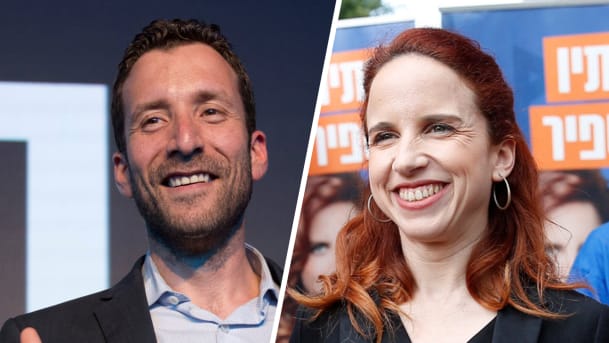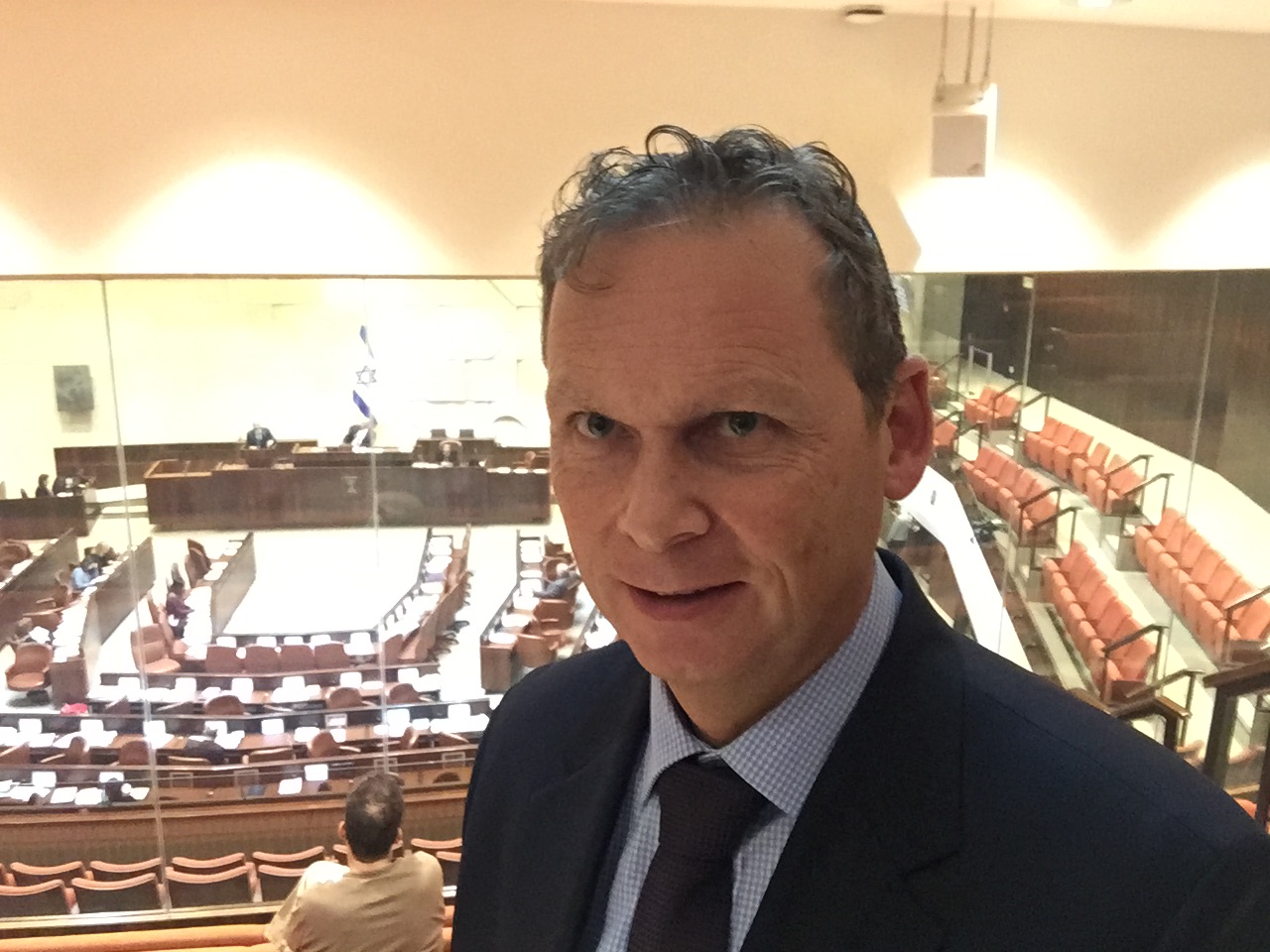
The Jewish Weekly’s election report, news briefs and latest poll table by JAMES MARLOW who has been covering Israeli elections as a political analyst since the eighties.
REPORT:
Labor Could Disappear
The Labor party’s popularity has been plummeting for weeks with some polls suggesting they would only receive four seats. But Avi Gabbay defiantly insists they will reach double figures on election-day, which is a change of attitude since last December when he claimed he would become Israel’s next Prime Minister.
This week the party held their internal primaries, and the leaders of the 2011 social economic protests, Itzik Shmuly and Stav Shaffir were the winners.
Next came, Shelly Yacimovich, Amir Peretz, Merav Michaeli, Omer Bar-Lev and Revital Swid. The second and tenth slots were reserved for Gabbay’s preferred candidates.
But the biggest loser was veteran MK of no fewer than seven Knesset’s and nearly 23 years of service, Eitan Cabel, who will be placed 15th on the final slate.
Cabel has been Gabbay’s most fierce critic from within the party, accusing him of being personally responsible for its declining public support. Speaking at the party conference last month, the lawmaker called for Gabbay to be removed in order to prevent the party from disappearing. But the tactic appears to have backfired and Cabel’s political career is now over.
Speculation continues over whether former Prime Minister Ehud Barak (who last week said he would not return to politics) will fill the number two slot. But Barak (who offered Yasser Arafat a full independent state at the Camp David II talks in 2000) was Labor’s last Prime Minister and it didn’t end very well.
At the time, President Bill Clinton told Arafat he would never receive a better deal, but the offer was still rejected and the suicide bombing campaign across Israel intensified. Labor was ousted from power in early 2001 and since that time, has been lost in the political wilderness. Another name raised to take the number two position, is former Shin Bet (Israel security agency) chief Yuval Diskin.
Before the primaries there was a strong chance that the Labor party would not receive the minimum four seats required to meet the 3.25% threshold on 9 April. But on Tuesday night, Channel 13 News reported that Labor enjoyed a post-primary boost, from five seats to eight. According to the pollster Camil Fuchs, the three extra seats came from former IDF chief of staff, Benny Gantz’s Israel Resilience Party.
Meanwhile Prime Minister Netanyahu this week ordered a review of the Likud primary results from polling centre data, after voting discrepancies surfaced, raising suspicions about the process.
Channel 12 News revealed that multiple irregularities and inconsistencies in the vote count raised many questions.
According to Kan radio, Culture Minister Miri Regev received 274 votes in a Bnei Brak polling station, even though only 64 people voted in the city. In a Kiryat Malachi station, Absorption Minister Yohav Gallant received 640 votes but only 60 were cast.
Elsewhere it was reported that 153 people voted at the Mitzpe Yeriho ballot, but Science and Technology Minister Ofir Akunis received 229 votes. Similar inconsistencies appeared in the vote counts in Netivot, Kisra, Hebron Hills Regional Council and other polling stations.
Juliette Lascar who heads the Likud chapter in Arad said she was contacting the police. Writing on her facebook account Lascar shared: “Considering there were 260 voters at the Arad polling station who each voted for 12 candidates, I find it very strange that there are only about 400 votes in total.” Lascar called for an investigation of those who brought the ballots from Arad to Likud headquarters in Tel Aviv.
American born Likud MK, Sharren Haskel, who received an unrealistic spot on the party list last week, insisted the discrepancies were a result of wrongdoing and argued that some candidates may have found a way to steal ballots.
Haskel and several other Likud MKs including David Bitan, Miki Zohar, Yoav Kisch, elected Tel Aviv representative Michal Shir and Judea and Samaria representative Shevah Stern, also argued that Netanyahu did not follow the correct process to get approval for the move.
They have since petitioned the party’s elections committee to revoke Netanyahu’s authority to appoint three candidates to the party’s list for the next Knesset. This and other disagreements may change the Likud list significantly in the coming days. In last week’s primary, Likud members voted to allow Netanyahu to appoint candidates to the 21st, 28th and 36th places on the list.
Bitan wrote in the petition that allowing the party leader to appoint people to the list requires a change in the Likud’s constitution, which can only be approved by a two-thirds majority of the Likud central committee.
Netanyahu said before the vote, that giving him this additional power would allow the Likud to be better prepared in the event that parties on the left merged. But if Netanyahu would seek to absorb another party into its Likud list, that would also require a two-thirds central committee vote.
ELECTION NEWS BRIEFS:
-
The owner of Hapoel Beersheva football club, Alona Barkat, has announced she is joining Naftali Bennett’s The New Right party. The high profile businesswoman will leave the management of the club to prevent a conflict of interests and join fellow candidates Justice Minister Ayelet Shaked, Jerusalem Post columnist Caroline Glick and MK Shuli Moalem-Refaeli.
-
It’s still not clear if the Joint List Arab faction has completely split. Last month Ahmed Tibi withdrew his Ta’al party (Arab Movement for Change) to run alone and then Ra’am (Islamic Movement) announced it was quitting, leaving just the militant Balad and Hadash parties. Efforts are now underway by community leaders to re-unite the four Arab factions which became the third largest political party in the last Knesset.
-
The National Union party led by Betzalel Smotrich has separated from the Bayit Yehudi (Jewish Home) faction now led by Rabbi Rafi Peretz. In a tweet on Monday night, Prime Minister Netanyahu urged all right wing parties to unite, saying if Bayit Yehudi, Otzma Yehudit, Eli Yishai’s Yahad party and the National Union do not unite, between 6 to 8 seats would be lost and the left will establish a government.
-
The New Right led by Naftali Bennett say they are willing to compromise on prayer at the Western Wall and conversion to Judaism. Speaking at an event in Tel Aviv, Ayelet Shaked declared, “We want to encourage more and more people to convert to Judaism and the best way to do that is through the army,” she said, praising the efforts of religious-Zionist Rabbi Haim Druckman. Former Jerusalem Post columnist and New Right candidate Caroline Glick also joined Shaked on stage, saying that seeking a freer conversion process, was one of the reasons Shaked and Education Minister Naftali Bennett broke off from Bayit Yehudi.
-
After admitting to the Yediot newspaper that he praised the 2005 disengagement plan from Gaza, Benny Gantz said, “I am going to be Prime Minister” and “I am going to beat Binyamin Netanyahu.” However Gantz continues to dodge the security question on whether he is right or left, which means he may or may not evacuate settlements, and he may or may not work towards the establishment of a Palestinian State. He also refused to say, who he had previously voted for in previous elections, but confirmed he did not vote for Yesh Atid and did not always vote for the same parties. Asked if he had ever voted for right wing parties, Gantz replied he had “always voted for parties in the centre, more or less” and that “the centre was a wide concept.”
-
Yesh Atid leader Yair Lapid offered Benny Gantz a political merger with his Israel Resilience party. Lapid suggested a joint leadership in the form of two leaders alternating after two years.
-
Orly Levy Abecassis, (daughter of former Likud Foreign Minister David Levy) says her Gesher party has been sought after by many parties from Meretz on the far left to the New Right party.
-
Controversial Likud MK Oren Hazan who has been an embarrassment to his party with his racist comments and selfies including one with President Trump when he landed at Ben Gurion airport, has asked the far right Otzma Yehudit party if he can join. Hazan was not elected to a realistic spot in the Likud list.
-
Kan radio reported that Yair Lapid approached Adina Bar-Shalom, the daughter of the late Shas party mentor and Torah sage, Ovadia Yosef z”l. Adina Bar-Shalom heads the Achi Yisraeli chareidi woman’s party looking to gain Knesset entry. Her father was very critical of Lapid’s father, the late Shinui party leader, Yosef “Tommy” Lapid. No further details were given.
-
Yaacov Litzman of the United Torah Judaism party said, “We will recommend Netanyahu to become Prime Minister after the election for as long as the law will allow us to.” Litzman went on to say that he is the best candidate in every respect, even though we have had arguments regarding Shabbat in the past.” Regarding Benny Gantz, Litzman said we would not support him “if he merges with Yair Lapid, who has harmed us in the past, unlike [Avigdor] Lieberman who only said he would harm us.”
-
An indictment against Netanyahu, pending a hearing, is expected in the next two weeks, but the hearing may not be until the end of 2019 or 2020.
-
Former Labor leader Avraham Burg said just before this week’s Labor primaries that “Labor must pack up and leave because it has not learnt how to change the government.” Burg claimed that the party “has no diplomatic path, no political path and no civil or social path and should make way for a new left wing entity.” He added that if the party does continue to function after the election, it should appoint Amir Peretz to be its leader.
ELECTION NEWS 2019
JAMES MARLOW compiles this week polls based on several pollsters including TNS Teleseker, Panels Politics, Direct Polls, Camille Fuchs, Dr Mina Tzemach and Mano Gever. James has made slight adjustments for marginal errors.
All political parties must register their name and submit their party lists to the Knesset Election Commission by 21 February.
The minimum threshold a party must receive to enter the Knesset is 3.25% of the vote cast which is the equivalent of four Knesset seats. If a party receives less, the votes are discarded.
Elections in Israel are always held on a Tuesday and are public holidays. The election for the twenty-first Knesset will be held on 9 April.










